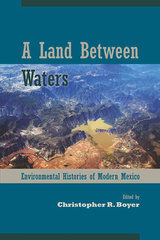
272 pages, 6 x 9
10 b&w photos, 1 map, 3 tables
Hardcover
Release Date:09 Oct 2018
ISBN:9780816537204
Land, Liberty, and Water
Morelos After Zapata, 1920–1940
SERIES:
The University of Arizona Press
Following the death of Emiliano Zapata in 1919, the Zapatistas continued to lead the struggle for land reform. Land, Liberty, and Water offers a political and environmental history of the aftermath of the 1910 Mexican Revolution by examining the outcomes of the insurgency in the state of Morelos.
Salvador Salinas takes readers inside the diverse pueblos of the former Zapatistas during the 1920s and 1930s and recounts the first statewide land reform carried out in postrevolutionary Mexico. Based on extensive archival research, he reveals how an alliance with the national government that began in 1920 stimulated the revival of rural communities after ten years of warfare and helped once-landless villagers reclaim Morelos’s valley soils, forested mountains, and abundant irrigation waters.
During the presidency of Plutarco Elías Calles (1924–1928), pueblos forged closer ties to the centralized government in Mexico City through a plethora of new national institutions, such as ejidos, forestry cooperatives, water juntas, credit societies, and primary schools. At the same time, the expansion of charcoal production in the Sierra de Ajusco and rice cultivation in the lowland valleys accelerated deforestation and intensified water conflicts.
Salinas recounts how the federal reforms embraced by the countryside aided the revival of the pueblos, and in return, villagers repeatedly came to the defense of an embattled national regime. Salinas gives readers interested in modern Mexico, the Zapatista revolution, and environmental history a deeply researched analysis of the outcomes of the nation’s most famous revolutionary insurgency.
Salvador Salinas takes readers inside the diverse pueblos of the former Zapatistas during the 1920s and 1930s and recounts the first statewide land reform carried out in postrevolutionary Mexico. Based on extensive archival research, he reveals how an alliance with the national government that began in 1920 stimulated the revival of rural communities after ten years of warfare and helped once-landless villagers reclaim Morelos’s valley soils, forested mountains, and abundant irrigation waters.
During the presidency of Plutarco Elías Calles (1924–1928), pueblos forged closer ties to the centralized government in Mexico City through a plethora of new national institutions, such as ejidos, forestry cooperatives, water juntas, credit societies, and primary schools. At the same time, the expansion of charcoal production in the Sierra de Ajusco and rice cultivation in the lowland valleys accelerated deforestation and intensified water conflicts.
Salinas recounts how the federal reforms embraced by the countryside aided the revival of the pueblos, and in return, villagers repeatedly came to the defense of an embattled national regime. Salinas gives readers interested in modern Mexico, the Zapatista revolution, and environmental history a deeply researched analysis of the outcomes of the nation’s most famous revolutionary insurgency.
The book’s green approach sets it apart from most other regional histories of Mexico and reveals a dimension to state formation long overlooked by the dominant theoretical models.’—Ben Fallaw, author of Religion and State Formation in Postrevolutionary Mexico
‘Taking into account the environmental components of Zapatismo, this book demonstrates both that the Morelos peasantry cared as much about water as they did about land and that their actions had ecological consequences. Thus Salinas has made sure Zapata’s movement will never be the same.’—Myrna I. Santiago, author of The Ecology of Oil: Environment, Labor, and the Mexican Revolution, 1900–1938
‘Salinas presents careful, solid research that throws new light on the political ecology of the Mexican Revolution and its long demobilization. This work will surely inspire more research in Morelos on shifting patterns of sugar and rice production, on the role of charcoal and other forest products in the livelihoods of rural dwellers, on migration, and on the ways people involved in regional economies and environments throughout Mexico responded to the decentralizing and recentralizing forces of the revolution.’ – Casey Walsh, H-Net Reviews
Salvador Salinas is an assistant professor of history at the University of Houston–Downtown.
Acknowledgments
List of Abbreviations
Introduction
1 Pueblo Politics
2 Fields and Forests
3 The Hydraulic Revolution
4 The Rice Bowl
5 The Noodle
Conclusion
Appendix A: Population of Morelos, 1921–1940
Appendix B: Rice Production in Mexico, 1920–1940
Notes
Bibliography
Index
















